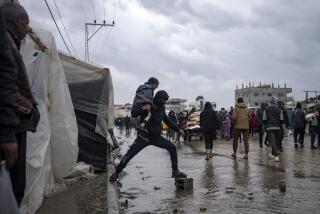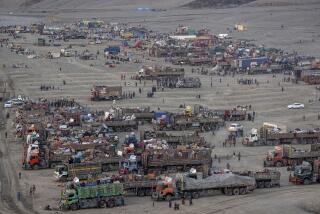In Afghan Camp, Survival Precedes Politics
- Share via
SHAIDAYEE, Afghanistan — In this refugee camp in the suburbs of Herat, a city in western Afghanistan newly liberated from the Taliban, residents go about their daily chores with grim expressions.
Silent women hiding beneath black embroidered head coverings bake bread in an oven of rock dug into the ground. Silent men in dirty turbans smack mud bricks onto crumbling walls that let in the cold.
Filthy children, their faces scarred by parasitic boils and their hair matted from months of not being combed, play quietly near heaps of donkey dung being dried for heating fuel.
No one here is celebrating the recapture of Herat province by warlord Ismail Khan. No formerly forbidden Afghan music blasts from dawn until after dusk, nor do children fly once-banned kites, nor does trade bustle like at Herat’s bazaar.
But the silence of Shaidayee’s 26,000 mostly ethnic Pushtun residents isn’t based on political considerations or their shared heritage with the ousted Taliban. It’s a matter of survival, of preparing for yet another winter with limited supplies that residents say are simply not enough.
“We want security. We have no problem with [Ismail Khan] leading us,” said resident Juma Khan, who estimates his age at 32 or 33. “What we need is for aid agencies to pay a little more attention to our living conditions.
“We need more firewood and food items. Seven kilos [about 15 pounds] of wheat is not enough for 10 days, let alone a month.”
But the displaced Afghans who came to this camp because of a long-standing drought in the country have new friends in high places. Herat Deputy Gov. Haj Mir Abdul Khallegh on Thursday welcomed the first international aid delegation to the city since the U.S.-led bombing campaign began in Afghanistan on Oct. 7. He urged the relief workers to hasten an end to the suffering at Shaidayee and nearby Maslakh, which are home to about 200,000 refugees.
“These people, they lost every part of their property they had at home, even their carpets and blankets,” Khallegh told Brunson McKinley, the director of the International Organization for Migration, at an impromptu meeting at the Foreign Ministry compound in Herat. “They are really needy people. We hope to do our best with your cooperation to just help these people.”
Khallegh called for teachers and schools, equipped kitchens and bathrooms with running water for the refugees. “Most of their problems are from dirt,” he said.
Before the meeting with the deputy governor, McKinley spent an hour touring Shaidayee, where aid workers have launched a roof-building project to hasten winterizing of the one-room, mud brick homes. Wooden poles and boards, along with plastic sheets, are being given to residents and are then covered with the mud bricks.
A convoy of 11 tractor-trailers from the aid agency arrived from Iran on Thursday to deliver 11,000 blankets and 50,000 bars of laundry soap, among other items.
“We’ll look into all these things and see what we can do,” McKinley said, referring to Khallegh’s requests. McKinley also asked warlord Khan to sign an agreement with the Geneva-based aid organization to allow its employees to formally resume their work with the blessing of the new provincial government.
Khallegh said he and other Herat leaders hope to be able to replace livestock and lost property next year for the refugees so that they can return home.
More to Read
Sign up for Essential California
The most important California stories and recommendations in your inbox every morning.
You may occasionally receive promotional content from the Los Angeles Times.













